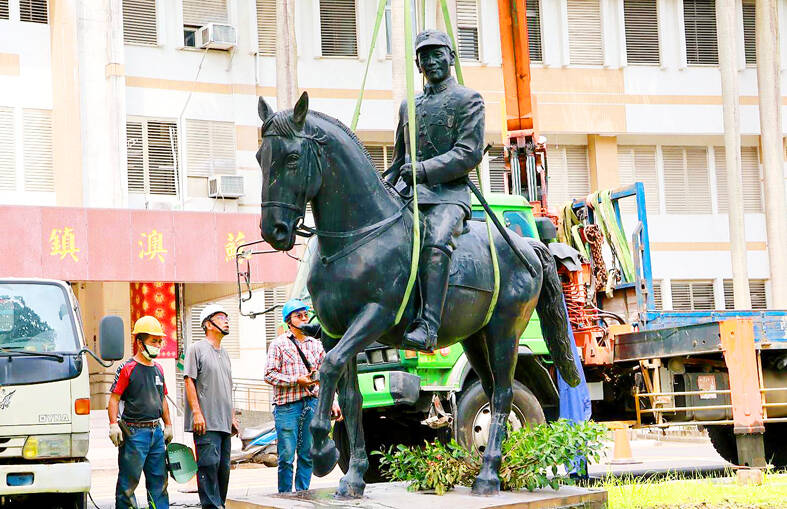The Ministry of National Defense and subordinate units have resisted the government’s attempts to remove symbols of Taiwan’s authoritarian past, despite state subsidies for the task, Executive Yuan officials told a meeting of the Internal Administration Committee at the legislature in Taipei on Monday.
Democratic Progressive Party (DPP) Legislator Huang Jie (黃捷) accused the Cabinet of inaction on a mandate to remove statues of and memorials to Chiang Kai-shek (蔣介石) from public spaces.
The government provides up to NT$100,000 per case for labor and other expenses to remove such items, but progress is lacking, Huang said, adding that only 165 of the 934 listed Chiang statues in public spaces had been removed, or less than 20 percent.

Photo courtesy of a reader
“The Executive Yuan should be more proactive on this matter and should make a decision on the fate of Chiang Kai-shek Memorial Hall,” she said.
She also referenced the work of Chen Chu (陳菊) of the DPP in her time as Kaohsiung mayor.
“Chen in 2007 made changes to the city’s Chiang Kai-shek Culture Center, renaming it the Kaohsiung Cultural Center, and removed Chiang’s statue from the site,” Huang said. “Kaohsiung did it 17 years ago ... while nothing has been done at Chiang Kai-shek Memorial Hall in Taipei to this day.”
The Executive Yuan’s Department of Human Rights and Transitional Justice said that a special task force has been set up under the supervision of the vice premier to plan and gather feedback regarding the Taipei site.
However, the task force has received mixed opinions from the public on whether to dismantle the hall or allow it to remain with changes to highlight transitional justice, department Deputy Director-General Shih Pu (石樸) said.
“One main area of resistance is from the defense ministry, as its units say they need discipline and leadership to supervise troops,” Shih said. “The ministry has said it needs to take into account military tradition.”
The minister of national defense last week said it was a military tradition to honor Chiang, who founded its training academies in China and Taiwan, adding that he considered military sites to be private property, the South China Morning Post reported.
Huang said that Chiang’s status must be removed from the Taipei site, including the military police unit that provides protection services for the memorial, with daily changings of the guard.
“Now that the government has declared May 19 to be White Terror Memorial Day, we must race against time for transitional justice and pick up the pace on the decision of what to do with the Chiang memorial in Taipei,” Huang said.
DPP Legislator Chang Hung-lu (張宏陸) said that action needs to be accelerated to recover “ill-gotten party assets” and put them to proper use, especially for transitional justice, and to provide compensation for people affected by the White Terror and the families of those who died.
Additional reporting by the Guardian

The first global hotel Keys Selection by the Michelin Guide includes four hotels in Taiwan, Michelin announced yesterday. All four received the “Michelin One Key,” indicating guests are to experience a “very special stay” at any of the locations as the establishments are “a true gem with personality. Service always goes the extra mile, and the hotel provides much more than others in its price range.” Of the four hotels, three are located in Taipei and one in Taichung. In Taipei, the One Key accolades were awarded to the Capella Taipei, Kimpton Da An Taipei and Mandarin Oriental Taipei. Capella Taipei was described by

EVA Airways today confirmed the death of a flight attendant on Saturday upon their return to Taiwan and said an internal investigation has been launched, as criticism mounted over a social media post accusing the airline of failing to offer sufficient employee protections. According to the post, the flight attendant complained of feeling sick on board a flight, but was unable to take sick leave or access medical care. The crew member allegedly did not receive assistance from the chief purser, who failed to heed their requests for medical attention or call an ambulance once the flight landed, the post said. As sick

Minister of Economic Affairs Kung Ming-hsin (龔明鑫) yesterday said that private-sector refiners are willing to stop buying Russian naphtha should the EU ask them to, after a group of non-governmental organizations, including the Centre for Research on Energy and Clean Air (CREA), criticized the nation’s continued business with the country. While Taiwan joined the US and its Western allies in putting broad sanctions on Russia after it invaded Ukraine in 2022, it did not explicitly ban imports of naphtha, a major hard-currency earner for Russia. While state-owned firms stopped importing Russian oil in 2023, there is no restriction on private companies to

INDUSTRY: Beijing’s latest export measures go beyond targeting the US and would likely affect any country that uses Chinese rare earths or related tech, an academic said Taiwanese industries could face significant disruption from China’s newly tightened export controls on rare earth elements, as much of Taiwan’s supply indirectly depends on Chinese materials processed in Japan, a local expert said yesterday. Kristy Hsu (徐遵慈), director of the Taiwan ASEAN Studies Center at the Chung-Hua Institution for Economic Research, said that China’s latest export measures go far beyond targeting the US and would likely affect any country that uses Chinese rare earths or related technologies. With Japan and Southeast Asian countries among those expected to be hit, Taiwan could feel the impact through its reliance on Japanese-made semi-finished products and